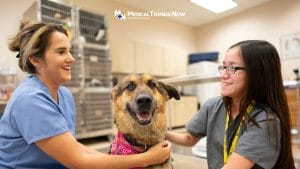Table of Contents
When it comes to choosing the right pet for medical doctors, there are a few things physicians need to keep in mind. Not all pets are created equal, and some pets are suitable for certain people than others.
Here are 11 tips for choosing the right pet for medical doctors.
What is your lifestyle like? Do you have a lot of time to spend with your pet?
We all know that being a medical doctor is one of the busiest professions.
Do you have a lot of time to spend with your pet?
Pets need attention, but they also need time to themselves. If you’re not able to give your pet the time it needs, then a pet may not be the best choice for you. Additionally, consider what type of pet would be perfect for your lifestyle and personality. For example, some healthcare professionals prefer dogs while others prefer cats.
When choosing the right pet for healthcare professionals, there are many factors to consider, including your lifestyle. Some pets are great for people who have a lot of time on their hands, while others are perfect for those who have less time to care for them. If you’re a busy person, it’s crucial to choose a pet that doesn’t require as much attention as one that does.
Additionally, if you live in an apartment or don’t have a lot of room, it might be best to choose a small pet instead of a large one. Finally, consider your personality when selecting the right pet. Some people are more active than others and might not be able to handle an active pet. If this is the case for you, consider choosing a passive
What type of home do you have? Choosing the right pet might require plenty of space?
If you have a small home, or if you don’t have enough space, consider a pet that doesn’t require as much space as a regular pet.
For example, a hamster or a gerbil can be great pets for people who don’t have much room.
On the other hand, if you have plenty of space, consider getting a pet that needs less space – like a cat or a dog.
What is your budget like? Choosing the right pet will require money!
If you’re looking for the right pet but don’t have a lot of money to spend, there are some things to keep in mind.
First, make sure you have room in your home for the pet.
Second, think about what kind of pet you would like.
Third, consider whether you want a pet that will require lots of attention or one that you can leave alone for periods of time.
Fourth, think about what kind of animal the pet will be living with – some pets are perfect for single households while others need companionship.
Finally, consider whether the pet is adoptable or if you will need to purchase it.
What is your household size? Are you choosing the right pet for the entire family?
When choosing the right pet, it is essential to consider your household size. Pets that are good for small households may not be the best fit for a larger one.
Additionally, some pets may not be compatible with other members of your family or roommates. If you are unsure if a pet is right for you, consult with an animal expert or check out the Petfinder website to find a suitable pet.
When considering whether or not to get a pet, think about what kind of animal would fit into your life and what kind of personality you would enjoy having around, if you have a one-pet family, then a single pet may be the best choice for you.
If you have room for more pets, consider adopting or buying a companion animal that can live peacefully together.
Do you have children? Choosing the right pet requires kids’ interaction.
If you do not have children, the pet may be a good fit for you. However, if you do have children, they may not be able to interact with the pet properly.
It is important to consider how old your children are and whether or not they can handle being around animals.
If your child is very young or cannot handle being around animals, it may be best to avoid getting a pet at all.
Is the pet spayed or neutered? This can help reduce the amount of pet-related health problems.
There are a few benefits to spaying and neutering your pet.
First of all, it can help reduce the amount of pet-related health problems.
Second, it’s often considered a humane treatment for animals.
And finally, it’s important to remember that not every animal is appropriate for every person.
If you’re thinking about getting a pet, make sure you consider whether or not the animal is spayed or neutered before making a decision.
What is the pet’s temperament like? Some pets are more active than others and may require more exercise than others.
When you are looking to adopt or purchase a pet, one of the most important factors to consider is its temperament.
Pets with temperaments that fit your lifestyle will be more enjoyable to have around and less likely to cause conflict.
Would you be able to provide the pet with the necessary food, water, and toys?
When choosing a pet, it is important to consider the animal’s needs. Some pets, like dogs and cats, require food, water, and toys in order to be happy.
Other pets, like hamsters and gerbils, do not require as much care.
It is important to consult with an expert if you are unsure about what type of pet would be best for you.
Consider whether the animal is house-trained.
If you’re thinking of getting a pet, one of the first things you’ll need to decide is what kind of animal to get. There are dozens of different types of pets to choose from, and each has its own set of pros and cons.
One thing to consider before making your decision is whether the animal is house-trained. Many pets, including dogs and cats, are already familiar with basic obedience commands such as sit, stay, come, and down. If you’re not comfortable training your pet yourself or if you have a tight schedule that doesn’t allow for consistent obedience training sessions, it might be best to look for an animal that isn’t house-trained.
House-trained pets are generally easier to care for and less likely to cause accidents. If you’re considering getting a pet, make sure to ask if the animal has been house-trained. If not, you’ll need to take the pet into your home regularly do the training.
Do you have any allergies or sensitivities to animals? If so, is the pet likely to trigger them?
If you have allergies or sensitivities to animals, it’s important to consider whether the pet you’re considering is likely to trigger them. For example, if you’re allergic to cats, a pet dog may not be a good choice because they share many of the same allergens.
Similarly, if you have a sensitivity to feathers, a pet that spends a lot of time outdoors like a llama may not be the best option because they’ll shed lots of feathers. It’s also important to consider how much time and energy the pet will require and whether you can commit to taking care of it.
If the pet is too much for you or requires too much time and energy, it may not be the best option for you.
Consider your personality and what kind of animal is suitable for you.
When it comes to choosing the right pet for physicians, it’s essential to consider your personality and what kind of animal is suitable for you.
Some people are more independent and like animals that don’t require too much attention, while others may prefer a pet that they can cuddle and take care of.
Ultimately, the best way to find out what kind of pet is right for you is by talking to your friends and family members who have pets or by doing some online research.
Takeaway: Choosing The Right Pet For Medical Doctors
When it comes to choosing the right pet for medical physicians, there are a few things to keep in mind. First and foremost, think about what kind of environment you want your pet to live in. Do you want a dog that will be able to run around outside all day long, or would you prefer a cat that stays indoors?
Once you know the type of pet that is right for your lifestyle, take into account your budget. Pets can be expensive, so make sure you have the right budget to spend on essentials and necessary things.
Finally, consider your personality and how well your pet will fit into your life. Some pets are more independent than others and may not enjoy cuddling every night.














